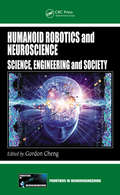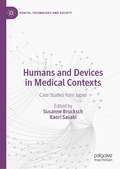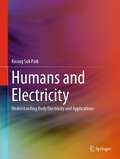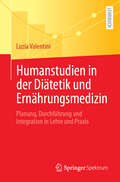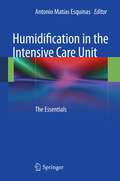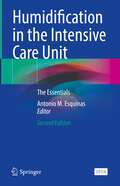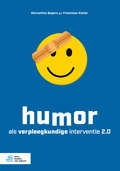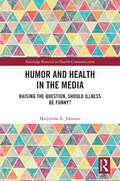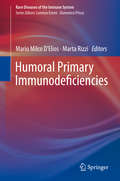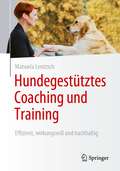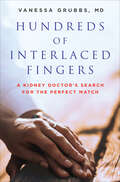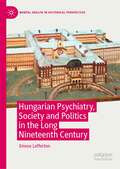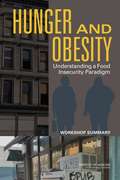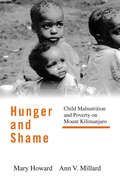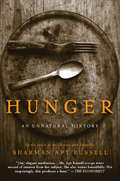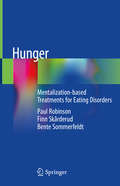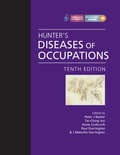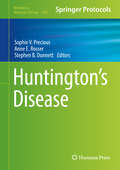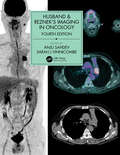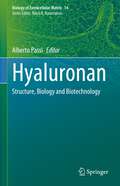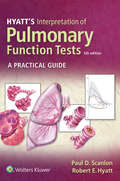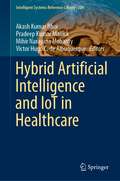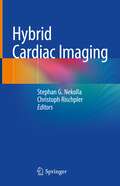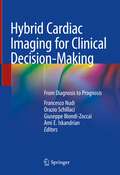- Table View
- List View
Humanoid Robotics and Neuroscience: Science, Engineering and Society
by Gordon ChengHumanoid robots are highly sophisticated machines equipped with human-like sensory and motor capabilities. Today we are on the verge of a new era of rapid transformations in both science and engineering-one that brings together technological advancements in a way that will accelerate both neuroscience and robotics. Humanoid Robotics and Neuroscienc
Humans and Devices in Medical Contexts: Case Studies from Japan (Health, Technology and Society)
by Susanne Brucksch Kaori SasakiThis book explores the ways in which socio-technical settings in medical contexts find varying articulations in a specific locale. Focusing on Japan, it consists of nine case studies on topics concerning: experiences with radiation in Hiroshima, Nagasaki, and Fukushima; patient security, end-of-life and high-tech medicine in hospitals; innovation and diffusion of medical technology; and the engineering and evaluating of novel devices in clinical trials. The individual chapters situate humans and devices in medical settings in their given semantic, pragmatic, institutional and historical context. A highly interdisciplinary approach offers deep insights beyond the manifold findings of each case study, thereby enriching academic discussions on socio-technical settings in medical contexts amongst affiliated disciplines. This volume will be of broad interest to scholars, practitioners, policy makers and students from various disciplines, including Science and Technology Studies (STS), medical humanities, social sciences, ethics and law, business and innovation studies, as well as biomedical engineering, medicine and public health.
Humans and Electricity: Understanding Body Electricity and Applications
by Kwang Suk ParkHumans are electric beings. We are managed, monitored, and stimulated electrically. This textbook provides students and practitioners with a solid foundation and understanding of human electricity and the work currently being done to further develop electrical signals for medical purposes and related goals. The book introduces the fundamentals of how biological systems generate electrical signals, covering a wide range of biomedical engineering topics including bioelectricity, biomedical signals, neural engineering, and brain-computer interface. The book is presented in three sections: Part I explains how electrical signals and impulses manage the human body; Part II examines the kinds of electrical signals from the human body and how they are monitored, controlled, and used; Part III looks at clinical use of electrical stimulation toward the human body and how they are being developed for interventions in medicine. The book is also a valuable professional reference for practicing engineers and scientists. Explains humans as electric beings who are managed, monitored, and stimulated electrically;Deals with the electricity of major human organs;Covers a wide range of biomedical engineering topics
Humanstudien in der Diätetik und Ernährungsmedizin: Planung, Durchführung und Integration in Lehre und Praxis
by Luzia ValentiniFür eine stärkere Verankerung der Ernährungsberatung und -therapie im Gesundheitssystem ist der Nachweis des Nutzens durch Ernährungsfachkräfte unerlässlich. Hierbei gelten die Prinzipien der evidenzbasierten Medizin: Ohne randomisierte kontrollierte Studien (RCTs) gibt es keine Anerkennung. Unmöglich? Nur, sofern man nicht die ersten Schritte wagt. Hochschulen bieten hervorragende Möglichkeiten, den Grundstein für die Etablierung der Diätetik als evidenzbasierte Wissenschaft zu legen. Die Durchführung von Humanstudien im Rahmen der akademischen Lehre fungiert als Katalysator. Sie erleichtert es Absolventen, eine wissenschaftliche Karriere anzustreben und beeinflusst nachhaltig ihre Herangehensweise in der täglichen Berufspraxis. Die Umsetzung von Humanstudien in Lehre und Praxis ist anspruchsvoll, aber bei sorgfältiger Vorbereitung durchaus machbar. Durch einfache, pragmatische Projekte auf internationalem Niveau kann eine solide Basis geschaffen werden. Zwar führt dies nicht unmittelbar zur Anerkennung durch den Gemeinsamen Bundesausschuss (G-BA), aber es trägt zu einem breiteren Kompetenzpool zukünftiger Ernährungsfachkräfte bei, die das Fachgebiet vorantreiben können. Dieses Lehrbuch richtet sich an Lehrende und Studierende der Diätetik, Oecotrophologie und Ernährungswissenschaften sowie an praktizierende Ernährungsfachkräfte. Es bietet umfassende Informationen zu den Grundlagen von Humanstudien, illustriert mit Beispielen aus der Lehre, und behandelt die Besonderheiten der evidenzbasierten Diätetik. Darüber hinaus werden die strukturellen Voraussetzungen für die Integration von Humanstudien in die hochschulische Lehre vorgestellt.
Humidification in the Intensive Care Unit
by Antonio EsquinasInadequate humidification of inspired gases can cause a variety of serious problems, and humidification has accordingly become an important aspect of modern intensive care medicine. This book is designed to serve as a practical guide for clinicians, providing information on the theoretical background of humidification, the equipment, and its optimal use. The book starts by examining the physiological basis of humidification. Current devices are then discussed, with careful attention to factors influencing their performance and methods to evaluate their effectiveness. The two scenarios of mechanical and non-mechanical ventilation are considered, and the issue of ventilator-associated pneumonia is addressed in detail. Further chapters focus on such topics as humidification following tracheostomy, humidification of the artificial airway during secretion management, measurement of inspired gas temperature in the ventilated neonate, and humidification in the home care setting.
Humidification in the Intensive Care Unit: The Essentials
by Antonio M. EsquinasThe 2nd edition of this book aims to underline how inadequate humidification of inspired gases can be the cause of a variety of serious problems and, thus, it brings new results and trends in humidification, updates about technological analyses in equipment’s ventilator modes and again the impact of humidification in complementary therapies such airway secretions in mechanical ventilated patients.These aspects are analysed in critically ill patients requiring various options of ventilatory approach (i.e. invasive, noninvasive, nasal high flow oxygen). The book starts with an exhaustive description of the pathophysiology of humidification in critically ill, and continues analyzing the impact of mechanical ventilation modalities (high-flow oxygen therapy, noninvasive mechanical ventilation, invasive mechanical ventilation, etc.), monitoring prevention of complications related to inadequate humidification. Important chapters are devoted to analyze determinants - ventilator associated pneumonia-humidification; humidification strategies in tracheostomized critical care patients; humidification and impact in airway clearance managements and the key aspects about humidification in the healthcare organization. This book is intended for all healthcare professionals working in Intensive Care Units (intensivists, anaesthesiologists, pulmonologist, neonatologist, nurses and respiratory therapist).
Humor als verpleegkundige interventie 2.0
by Marcellino Bogers Fransiska KleijerLachen is pijnstillend, ontspannend en helpt mensen om te gaan met hun angsten. Het toepassen van humor is dan ook een officiële verpleegkundige interventie (Bulechek, 2016). Voor de verpleegkundige zelf is gebruik van humor een goede remedie tegen burn-out. Toch wordt er tijdens de verpleegkundige opleiding en op de werkvloer niet uitgebreid stilgestaan bij de werking, de effecten en de mogelijkheden van gebruik van humor. Als je daar meer van weet, kun je humor bewust inzetten en op een natuurlijke manier deel uit laten maken van je werk. In dit boek vind je theoretische en praktische informatie, ervaringen van collega’s en vele voorbeelden. Na het lezen ervan heb je onder meer inzicht in de effecten van het gebruik van humor, weet je welke soorten humor er zijn, kun je een oordeel vormen over wat wel en wat niet kan en kun je serieus met humor aan de slag. Deze tweede, geactualiseerde en herziene editie is onder meer uitgebreid met informatie over het inzetten van humor bij mensen met dementie en in de palliatieve zorg. Daarnaast wordt er een oproep gedaan aan de docenten, kun je erachter komen wat jouw eigen humorstijl is en delen vele deskundigen, zoals Sibe Doosje, Huub Buijssen, Saskia Teunissen, Marinus van den Berg en Jeffrey Wijnberg, hun ervaringen en/of kennis over gebruik van humor. Dit boek is bestemd voor alle verpleegkundigen, verzorgenden en andere professionals met directe patiënten/cliëntencontacten en voor docenten werkzaam bij zorg- en welzijnsopleidingen en hun studenten
Humor and Health in the Media: Raising the Question, Should Illness be Funny? (Routledge Research in Health Communication)
by Malynnda A. JohnsonExamining popular media portrayals of various health topics, this book offers a critical analysis of how those mediated messages can impact, for good or ill, people’s physical and mental health.Looking specifically at how various depictions of health topics have both aided in the normalization of health topics such as neurodiversity and HIV while also critiquing the dissemination of misinformation on these same topics, this book offers insight into the ways in which humorous content can both help and hurt. The author draws on a critical analysis of popular media including shows, social media, and stand-up specials, as well as interviews with those who use humor within health settings, such as Red Nose Docs, comedians who focus on their own health issues.This insightful study will interest scholars and students of health in popular culture as well as health communication, media studies, public health administration, and health policy.
Humoral Primary Immunodeficiencies (Rare Diseases of the Immune System)
by Mario Milco D’Elios Marta RizziHumoral Primary Immunodeficiencies
Hundegestütztes Coaching und Training: Effizient, wirkungsvoll und nachhaltig
by Manuela LentzschHunde bieten für Menschen als lebende, denkende und fühlende Lebewesen im Coaching und Training viele Mehrwehrte. Manuela Lentzsch erläutert in diesem Buch, warum gerade Hunde so wunderbare Co-Trainer sind und welche verschiedenen Rollen und Funktionen sie dabei einnehmen können.Das Buch zeigt neben den Grundlagen und den Wirkungsweisen von hundegestütztem Coaching und Training vor allem die Einsatzmöglichkeiten sowie Praxisbeispiele und konkrete Interventionen zur praktischen Anwendung auf. Die tiergestützten Übungen sind nach Persönlichkeits-, Führungskräfte- und Teamentwicklung unterteilt. Ein besonderes Augenmerk legt die Autorin neben dem klientenzentrierten auf einen tierzentrierten Ansatz, welcher dem Wohlbefinden des Hundes Rechnung trägt. Wichtige Aspekte der Qualitätssicherung sowie Auswahlkriterien beim Hund und tierschutzrelevante Gesichtspunkte werden daher in diesem Werk ebenfalls beleuchtet. Das Buch bietet einen fundierten Leitfaden für Menschen, die mehr überhundegestütztes Coaching und Training erfahren wollen.Die ZielgruppenCoaches, Trainern und Hundeerziehern eröffnet das Buch ein spannendes zusätzliches Geschäftsfeld und zeigt deren Wirksamkeit, Grenzen sowie Einsatzmöglichkeiten auf. Führungskräfte erfahren, welche Kompetenzen sie durch hundegestütztes Coaching und Training effizienter, wirksamer und nachhaltiger bei sich selbst, oder in ihrem Team stärken können. Hundehalter erhalten zudem Anregungen für die eigene Persönlichkeitsentwicklung mit ihrem Hund und können von einer verbesserten Mensch-Hund-Beziehung profitieren.
Hundreds of Interlaced Fingers: A Kidney Doctor's Search for the Perfect Match
by Vanessa GrubbsA doctor shares her unforgettable love story & informative journey into the world of medicine in this “thoughtful and endearing” memoir (Washington Post).When Vanessa met Robert, she had no idea that their relationship would thoroughly transform her life. Robert was suffering from end-stage kidney disease, which required him to endure years of debilitating dialysis in order to stay alive, at least until his failed organ could be replaced by a kidney transplant. Although Vanessa was a primary care doctor, she developed a deeper understanding of the difficulties Robert faced, including dialysis and finding a donor. So, even though they were still in the early stages of their relationship, she volunteered one of her own kidneys for testing and discovered that she was a match. This life-affirming donation forged a bond that would become a pillar of Vanessa and Robert’s marriage—and the beginning of a new career.Motivated by Robert’s experience and her newfound knowledge, Vanessa became a nephrologist—a kidney doctor—and discovered far more about the realities of the specialty. Shaped by Vanessa’s remarkable expertise as a doctor, a woman of color, a mother, and a kidney donor, Hundreds of Interlaced Fingers is a love story as well as an informative guide to kidney disease.Praise for Hundreds of Interlaced Fingers“A story told beautifully, courageously, and honestly. You’ll never forget Vanessa and Robert, and you’ll never view medicine quite the same way again.” —Robert Winchester, MD, author of the New York Times–bestseller The Digital Doctor“Intense, ambitious, and fascinating.” —Victoria Sweet, MD, award–winning author of God’s Hotel
Hungarian Psychiatry, Society and Politics in the Long Nineteenth Century (Mental Health in Historical Perspective)
by Emese LaffertonThis book provides the first comprehensive study of the history of Hungarian psychiatry between 1850 and 1920, placed in both an Austro-Hungarian and wider European comparative framework. Taking an interdisciplinary approach, the book captures the institutional worlds of the different types of psychiatric institutions intertwined with the intellectual history of mental illness and the micro-historical study of everyday institutional practice. It uncovers the ways in which psychiatrists gradually organised themselves and their profession, defined their field and role, claimed expertise within the medical sciences, lobbied for legal reform and the establishment of psychiatric institutions, fought for university positions, the establishment of departments and specialised psychiatric teaching. Beyond this story of increasing professionalization, this study also explores how psychiatry became invested in social critique. It shows how psychiatry gradually moved beyond its closely defined disciplinary borders and became a public arena, with psychiatrists broadening their focus from individual patients to society at large, whether through mass publications or participation in popular social movements. Finally, the book examines how psychiatry began to influence the concept of mental health during the first decades of the twentieth century, against the rich social and cultural context of fin-de-siècle Budapest and the Austro-Hungarian Dual Monarchy.
Hunger and Obesity: Understanding a Food Insecurity Paradigm - Workshop Summary
by Institute of Medicine of the National AcademiesAt some point during 2009, more than 17 million households in the United States had difficulty providing enough food for all their members because of a lack of resources. In more than one-third of these households, the food intake of some household members was reduced and normal eating patterns were disrupted due to limited resources. The Workshop on Understanding the Relationship Between Food Insecurity and Obesity was held to explore the biological, economic, psychosocial, and other factors that may influence the relationship between food insecurity, overweight, and obesity in the United States. Hunger and Obesity examines current concepts and research findings in the field. The report identifies information gaps, proposes alternative approaches to analyzing data, recommends new data that should be collected, and addresses the limitations of the available research.
Hunger and Shame: Child Malnutrition and Poverty on Mount Kilimanjaro
by Mary Howard Ann V. MillardIn discussing the moral and practical dilemmas posed by the malnourished children in Mount Kilimanjaro, the authors explore the shame associated with child hunger in relation to social organization, colonial history and global economy.
Hunger: An Unnatural History
by Sharman Apt RussellEvery day, we wake up hungry. Every day, we break our fast. Hunger is both a natural and an unnatural human condition. In Hunger, Sharman Apt Russell explores the range of this primal experience. Step by step, Russell takes us through the physiology of hunger, from eighteen hours without food to thirty-six hours to three days to seven days to thirty days. In quiet, elegant prose, she asks a question as big as history and as everyday as skipping lunch: How does hunger work?
Hunger: Mentalization-based Treatments For Eating Disorders
by Paul Robinson Finn Skårderud Bente SommerfeldtThis work presents the adaptation of mentalization-based therapy for use in Eating Disorders (MBT-ED). The book starts with a presentation of the theoretical concept of mentalization and describes eating disorders from this perspective. This is followed by a discussion of the place of MBT-ED in eating disorders practice. MBT is first presented as the original model for borderline personality disorder, and then the model is further developed to address specific symptoms found in eating disorders, such as body image disturbance, restriction and purging. The original MBT model consists of outpatient treatment combined with individual and group psychotherapy, and psychoeducation in groups. The book then looks at supervision and training, and how an eating disorders team can develop a mentalizing focus. It goes on to describe the training required for practitioners to deliver individual and group MBT-ED and to supervise therapy. Lastly, it examines the implementation of the approach in different clinical settings, including inpatient services, and how management can be involved in negotiating barriers and taking advantage of enablers in the system. The authors have conducted a pilot randomized controlled trial and qualitative research in MBT-ED and have extensive experience in providing and supervising this novel therapy. MBT-ED is one of the few therapies for eating disorders that links theory of mind, and attachment and psychodynamic therapies and as such will be of great theoretical interest to a wide variety of clinicians and researchers.
Hunter's Diseases of Occupations
by Tar-Ching Aw Anne Cockcroft Paul Durrington J Malcolm Harrington Peter J BaxterWinner of the 2011 BMA book awards: medicine categoryIn the five decades since its first publication, Hunter's Diseases of Occupations has remained the pre-eminent text on diseases caused by work, universally recognized as the most authoritative source of information in the field. It is an important guide for doctors in all disciplines who may
Hunting the 1918 Flu
by Kirsty E. DuncanIn 1918 the Spanish flu epidemic swept the world and killed an estimated 20 to 40 million people in just one year, more than the number that died during the four years of the First World War. To this day medical science has been at a loss to explain the Spanish flu's origin. Most virologists are convinced that sooner or later a similarly deadly flu virus will return with a vengeance; thus anything we can learn from the 1918 flu may save lives in a new epidemic.Responding to sustained interest in this medical mystery, Hunting the 1918 Flu presents a detailed account of Kirsty Duncan's experiences as she organized an international, multi-discipline scientific expedition to exhume the bodies of a group of Norwegian miners buried in Svalbard, all victims of the flu virus. Constant throughout is her determination to honour the Norwegian laws and the Svalbard customs that treat the dead and the living with respect - especially when a live virus, if unearthed, could kill millions. Another theme of the book is the author's growing love for Svalbard and its people. Duncan's narrative describes a large-scale medical project to uncover genetic material from the Spanish flu; it also reveals the turbulent politics of a group moving towards a goal where the egos were as strong as the stakes were high. The author, herself a medical geographer, is very frank about her bruising emotional, financial, and professional experiences on the 'dark side of science.'Duncan raises questions not only about public health, epidemiology, the ethics of science, and the rights of subjects, but also about the role of age, gender, and privilege in science. While her search for the virus has shown promising results, it has also revealed the dangers of science itself being subsumed in the rush for personal acclaim.
Huntington’s Disease (Methods in Molecular Biology #1780)
by Stephen B. Dunnett Sophie V. Precious Anne E. RosserThis detailed book provides a laboratory manual and guidebook for the selection, implementation, and interpretation of a wide range of techniques in contemporary use in leading laboratories engaged in Huntington’s disease (HD) research worldwide. Only by understanding the pathology and pathogenic process at the fundamental molecular and cellular level can the research community expect to be able to slow or halt the disease process, repair the damage, and develop novel effective therapies to treat the symptoms of this condition, thus this volume collects the practical knowledge of its authors. Written for the highly successful Methods in Molecular Biology series, chapters include introductions to their respective topics, lists of the necessary materials and reagents, step-by-step, readily reproducible laboratory protocols, and tips on troubleshooting and avoiding known pitfalls. Authoritative and invaluable, Huntington’s Disease aims to help scientists to significantly extend the breadth and quality of research in laboratories dedicated to mastering and controlling this devastating human condition.
Husband & Reznek's Imaging in Oncology
by Anju Sahdev and Sarah J VinnicombeThis comprehensive reference provides an overview of the general principles of cancer staging, as well as specific discussions of each tumour type across the body, including lymphoma and haematological malignancies. For each tumour, the pattern of disease involvement and disease spread are emphasized, the state-of-the-art imaging features surveyed, and the latest tumour staging and methods to assess treatment response are addressed. Separate sections discuss metastatic disease and the effects of treatment on normal and diseased tissues. The final section of the book highlights emerging functional and molecular imaging techniques to evaluate the different biological hallmarks of cancer.
Hyaluronan: Structure, Biology and Biotechnology (Biology of Extracellular Matrix #14)
by Alberto PassiThis book addresses the structural and biological properties of the extracellular matrix component and glycosaminoglycan polymer hyaluronan (or hyaluronic acid, HA).The book discusses various aspects of HA biology, e.g., HA synthesis and degradation, as well as the role of HA in embryogenesis, development, and cell maintenance. The reader will learn about the role of HA in different tissues as well as its biological activities triggered by the interaction with different HA receptors. A closer look is had at the involvement of HA in human pathologies such as cancer, kidney fibrosis and wound healing. Biotechnological and biomedical applications for HA such as scaffold generation and drug delivery, including the novel synthetic sulphated HA are explored.This work will appeal to a wide readership within the extracellular matrix and hyaluronan field. It can serve as an introduction to the field for junior scientists but can also help senior scientists to gain a broader view of the field beyond their area of specialization.The series Biology of Extracellular Matrix is published in collaboration with the American Society for Matrix Biology and the International Society for Matrix Biology.
Hyatt's Interpretation of Pulmonary Function Tests
by Paul D. ScanlonPractical and clinically relevant, Hyatt’s Interpretation of Pulmonary Function Tests provides user-friendly coverage of all types of pulmonary function testing as it applies to a wide range of disease conditions. In this revised 5th Edition, Dr. Paul D. Scanlon expands upon the tradition of excellence begun by renowned pulmonary physiologist and father of the flow-volume curve, Dr. Robert E. Hyatt. A new two-color design, new and reorganized cases, and revised and expanded content keep you up to date with all that's new in the field.
Hybrid Artificial Intelligence and IoT in Healthcare (Intelligent Systems Reference Library #209)
by Akash Kumar Bhoi Pradeep Kumar Mallick Victor Hugo C. de Albuquerque Mihir Narayana MohantyThis book covers applications for hybrid artificial intelligence (AI) and Internet of Things (IoT) for integrated approach and problem solving in the areas of radiology, drug interactions, creation of new drugs, imaging, electronic health records, disease diagnosis, telehealth, and mobility-related problems in healthcare. The book discusses the convergence of AI and the hybrid approaches in healthcare which optimizes the possible solutions and better treatment. Internet of Things (IoT) in healthcare is the next-gen technologies which automate the healthcare facility by mobility solutions are discussed in detail. It also discusses hybrid AI with bio-inspired techniques, genetic algorithm, neuro-fuzzy algorithms, and soft computing approaches which significantly improves the prediction of critical cardiovascular abnormalities and other healthcare solutions to the ongoing challenging research.
Hybrid Cardiac Imaging
by Stephan G. Nekolla Christoph RischplerThis clinically oriented book provides an up-to-date review on the various hybrid imaging modalities that may be employed for the purpose of cardiac imaging. After discussion of generic aspects of hybrid imaging, SPECT/CT, PET/CT, and PET/MRI are each considered in depth. In addition, information is provided on upcoming technologies, such as dedicated so-called fast cardiac cameras (CZT detector technology) and novel probes and radiotracers. A wide variety of topics are addressed, including important technological aspects, possible applications, imaging protocols, peculiarities of the available modalities, radiation exposure, and dose reduction. Last but not least, an estimation of the cost efficiency of dedicated and hybrid imaging devices in cardiology is provided and possible scenarios with respect to health care economics are envisioned. Hybrid Cardiac Imaging will be of particular value for nuclear medicine specialists, cardiologists, and radiologists and will also be of interest to medical physicists, medical technicians, and cardiothoracic surgeons.
Hybrid Cardiac Imaging for Clinical Decision-Making: From Diagnosis to Prognosis
by Giuseppe Biondi-Zoccai Orazio Schillaci Ami E. Iskandrian Francesco NudiPerforming any diagnostic test in medicine is always a matter of trying to get the condition of the patient diagnosed properly with the least effort, exposure, discomfort and at the same time with the lowest possible error probability.Pre-test probability is helpful but often imprecise, effectively overestimating the patient's risk profile. In a broader prevention objective, the phases of a disease, its onset, progression, and complications must be taken into account. The negative predictive value, which is so important, has in turn its main limitation in identifying the healthy patient, that is, the one who does not belong to any cluster of patients in which we would act in terms of prevention. In coronary syndromes, the goal is instead to evaluate coronary heart disease, from mild to more extensive and significant forms. For this purpose, it is necessary to use parameters that investigate different and complementary aspects: stenosis, ischemia, the morphology of the atherosclerotic plaque, metabolic processes, in particular vitality and apoptosis, the presence of inflammatory processes. The possibility, already present thanks to Hybrid Imaging, of 'joining’ exams that study different aspects, will allow the patient to be increasingly characterized not only from a diagnostic point of view but also from a prognostic and personalized therapeutic choice.
